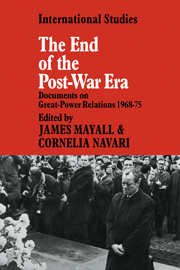Book contents
- Frontmatter
- Contents
- Preface
- Source Abbreviations
- Note on the texts of the documents
- Introduction
- I THE END OF THE COLD WAR
- II THE DIPLOMACY OF DETENTE
- III CHANGES IN THE WESTERN ALLIANCE
- A The North Atlantic Treaty Organization
- B The Eurogroup
- C The European Community
- IV THE WARSAW TREATY ORGANISATION
- V THE GREAT POWERS AND THE MIDDLE EAST WAR OF OCTOBER 1973
- VI THE CRISIS OF THE INTERNATIONAL ECONOMIC ORDER
B - The Eurogroup
Published online by Cambridge University Press: 07 October 2011
- Frontmatter
- Contents
- Preface
- Source Abbreviations
- Note on the texts of the documents
- Introduction
- I THE END OF THE COLD WAR
- II THE DIPLOMACY OF DETENTE
- III CHANGES IN THE WESTERN ALLIANCE
- A The North Atlantic Treaty Organization
- B The Eurogroup
- C The European Community
- IV THE WARSAW TREATY ORGANISATION
- V THE GREAT POWERS AND THE MIDDLE EAST WAR OF OCTOBER 1973
- VI THE CRISIS OF THE INTERNATIONAL ECONOMIC ORDER
Summary
Speech by Mr Healey, British Secretary of State for Defence, to the Association for Defence Studies, Munich, 1 February 1969 (extract)
What does seem to emerge strongly from a look at the possible developments of the next decade is the case for more military cooperation among the European members of NATO – the establishment of a European identity within the Atlantic Alliance. In the past many Europeans, myself among them, have been reluctant to move too far or fast in this direction for fear of encouraging a reduction in America's commitment tp NATO. I believe that today the argument points in the opposite direction. As all American leaders have stressed, nothing would do more to encourage the United States to maintain its necessary commitment than the sight of the European countries working effectively together inside the Alliance.
In any case, once America and Russia begin discussions on the future of the nuclear balance between them issues of the most vital and direct importance to the countries of Western Europe will arise. Unless Europe is prepared to put a collective view on these issues, the chance of influencing the course of the discussions will be remote. I can conceive situations too in which movement towards solving some of the issues which separate the peoples of Eastern Europe from their West European brothers could be made easier to the extent that Western Europe is less totally dependent on the US for its security.
- Type
- Chapter
- Information
- The End of the Post-War EraDocuments on Great-Power Relations 1968-1975, pp. 382 - 400Publisher: Cambridge University PressPrint publication year: 1980

